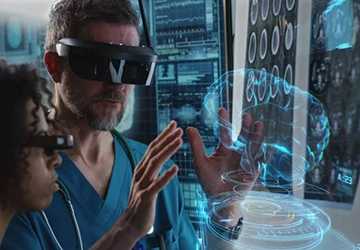Technology's Reshaping of the Workplace Charting the Future of Careers
As technology advances at an unprecedented rate, its impact on the job market and career trajectories has become increasingly important. Technology's impact on employment is profound and transformative, from automation to artificial intelligence. This article explores the various implications of these impacts, emerging trends in future careers, and strategies for individuals to adapt to technology in the workplace and thrive in this changing environment.

Impact of Technology on Employment
Automation and Job Shifts
An important aspect of technology's impact on employment is the advent of automation. Machines and software are now taking over tasks traditionally performed by humans, leading to the redistribution of jobs across sectors. However, this change has also brought new opportunities for those who can adapt and retrain.
The Rise of Artificial Intelligence and Machine Learning
Artificial intelligence and machine learning are at the forefront of technological advancement. These innovations are revolutionizing industries such as healthcare, finance, and manufacturing. Technology's impact on jobs in these fields includes creating new roles requiring specialized AI and machine learning skills.
Remote Work and Digital Nomadism
The COVID-19 pandemic has accelerated the adoption of remote work and highlighted another aspect of technology's impact on the workplace. Advances in communication tools and collaboration platforms have enabled more people to work from anywhere worldwide, giving rise to digital nomadism.
Future Career Trends
New Industries
As technological advancement continues unstoppable, new industries are constantly emerging. Industries such as renewable energy, biotechnology, and cybersecurity are experiencing significant growth. Understanding these future career trends can help individuals prepare for future employment opportunities.
Gig Economy and Freelancing
The gig economy is booming and offers more flexible work arrangements. Digital platforms connecting freelancers with clients worldwide are driving this trend. Those who stay ahead of future career trends can take advantage of these opportunities.
Skills and Training
The skills required in today's job market are constantly changing. People must continually update their skills and education to keep up with future career trends. Online courses, certifications, and training programs are becoming essential for career advancement.
Adapting Technology in the Workplace
Lifelong Learning
Adapting technology in the workplace requires lifelong learning. The rapid pace of technological change means that skills can quickly become obsolete. A mindset of continuous improvement is essential for success.
Embrace Change
Resistance to change can hinder career advancement. To succeed in a technology-driven environment, one must embrace change and be open to new working methods. This includes introducing new tools and technologies that can improve productivity and efficiency.
Collaboration and Communication
Effective collaboration and communication are essential components of adapting technology in the workplace. Using digital tools to collaborate in teams and maintaining clear lines of communication can lead to better outcomes and a more cohesive work environment.
Work-Life Balance
Despite technology's many benefits, it is also essential to maintain a healthy work-life balance. Adapting to technology in the workplace requires setting boundaries and effective time management to avoid burnout and ensure long-term well-being.
Impact of Robotics on Employment
Robotics in Manufacturing
Robotics is profoundly impacting the impact of technology on employment, especially in the manufacturing industry. Sophisticated autonomous machines can perform complex tasks with unprecedented precision, reducing the need for human intervention. This paradigm shift requires a workforce that can manage and maintain these robotic systems and create new job roles that did not exist before.
Automation in the Service Industry
The service industry is also experiencing the impact of technology on employment through the integration of robotics. From automated checkouts to robotic kitchens, the industry is transforming and requires employees to have new skills and knowledge.
Robotics in Healthcare
In healthcare, robotics is revolutionizing patient care and surgical procedures. Technology's impact on jobs in this field includes the need for experienced technicians and engineers who can design, operate, and maintain medical robots and medical professionals who can work with these machines.
Blockchain Technology and Career Opportunities
Financial Sector Transformation
Blockchain technology has a significant technological impact on employment in the financial sector. The decentralization and transparency provided by blockchain facilitate the creation of new financial products and services, requiring a workforce that understands blockchain technology and its myriad applications.
Supply Chain Management
Blockchain is also transforming supply chain management by improving traceability and reducing fraud. The impact of this technology on employment requires blockchain expertise to optimize supply chain processes and ensure transaction integrity.
Cybersecurity Improvements
As blockchain technology becomes more prevalent, the demand for cybersecurity professionals grows. Understanding the impact of technology on blockchain-related jobs requires recognizing the need for professionals who can strengthen blockchain networks and prevent cyber threats.
Virtual and Augmented Reality in the Workplace
Training and Development
Virtual and augmented reality (VR/AR) create immersive training experiences that reflect technology's impact on workforce development efforts. These technologies enable realistic simulations that improve skills and safety and require trainers proficient in VR/AR design and implementation.
Remote Collaboration
VR and AR improve remote collaboration by creating virtual workspaces where employees can interact in real-time. The impact of this technology on the workplace includes roles that focus on developing and managing these virtual environments to enable efficient teamwork.
Customer Experience
In customer service, VR and AR create engaging, interactive experiences. Technology's impact on the workplace includes developing content and applications that leverage these technologies to increase customer satisfaction and loyalty.

Applications of AI in Decision-Making
Data Analysis and Insights
Artificial intelligence is revolutionizing the decision-making process by providing advanced data analysis capabilities. The impact of technology on employment includes the need for data scientists and analysts who can interpret AI-generated insights to make strategic business decisions.
Predictive Analytics
AI-driven predictive analytics predict trends and behaviours that influence future career trends. AI and machine learning professionals are in great demand to develop and apply these predictive models.
Ethical Considerations
As AI becomes more integrated into decision-making, ethical considerations increase. The impact of technology on the workplace includes ensuring that AI applications are moral and do not perpetuate bias or injustice.
Sustainability and Green Technology
Renewable Energy Careers
The transition to renewable energy is an essential trend in future careers. As careers in solar, wind, and other renewable energy fields increase, expertise and skills in sustainable technologies will be needed.
Environmental Impact Assessment
As the industry adopts green technology, the impact of this technology on employment also includes environmental impact assessment tasks. These professionals assess the impact of new technologies on the environment and ensure compliance with environmental regulations.
Sustainable Manufacturing
Another future career trend is the shift to sustainable manufacturing practices; this involves developing and implementing processes that minimize waste and reduce carbon footprint, creating opportunities for those proficient in green manufacturing techniques.
Biotechnology and Healthcare Innovation
Genetic Engineering
Advances in biotechnology, such as B. genetic engineering, are leading to new future career trends in healthcare. Professionals with genome editing and biotechnology expertise are needed to develop treatments for various diseases.
Personalized Medicine
The trend toward personalized medicine, where treatments are tailored to an individual's genetic profile, has a significant technological impact on healthcare jobs; this requires knowledge of genomics, data analytics, and patient care.
Telemedicine
Telemedicine has expanded healthcare access and has had a significant technological impact on the workplace. To meet the demand for virtual care services, healthcare providers must be familiar with telemedicine technology and treat patients remotely.
Quantum Computing and Its Impact
The Role of Advanced Computing
Quantum computing will revolutionize various industries by solving complex problems beyond classical computers' capabilities. This technology's impact on jobs creates a demand for quantum computing experts who can develop and implement these cutting-edge systems.
Cryptography and Security
Quantum computing is also impacting cryptography and cybersecurity. Understanding the technology's impact on jobs in this field requires developing new cryptographic techniques resistant to quantum attacks and requiring expertise in quantum-safe encryption.
Research and Development
Continued research and development in quantum computing are driving new career trends in the future. Scientists and engineers need to push the limits of quantum computers to open up new avenues for innovation and discovery.
Conclusion
The impact of technology on employment is undeniable, bringing both challenges and opportunities. By understanding future career trends and adapting to technology in the workplace, people can navigate this changing landscape and build successful, fulfilling careers. Lifelong learning, being open to change, and leveraging technology to collaborate are essential to success in the future of work.